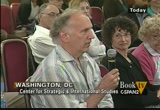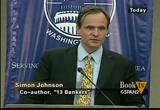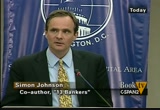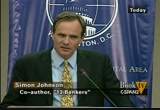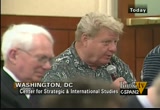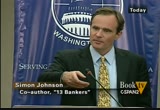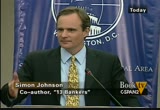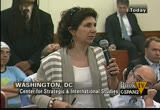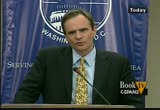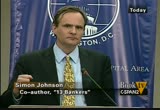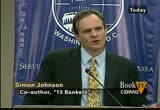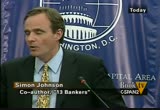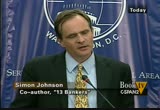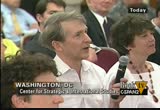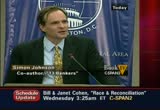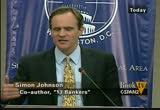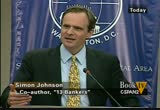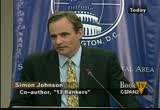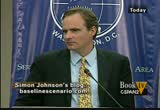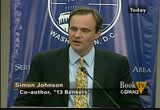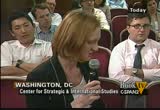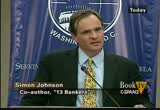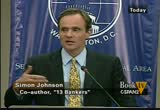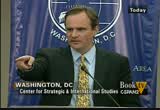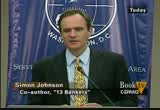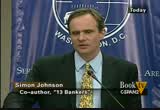tv [untitled] CSPAN April 7, 2010 2:00am-2:30am EDT
2:00 am
and this problem will be fixed when and if people like yourself become convinced and convince the people you know and vote for people who make this a top priority. and i think if we are lucky we can do it in ten years. if we are lucky we can have a teddy roosevelt moment but we haven't even started yet and now is the time to begin. thank you very much. [applause]
2:01 am
>> yes, i would like -- hello? who else besides you is making this case that is a political figure who is marshalling arguments based on evidence essentially you're a professor speaking with practical experience and who is doing it in the political form other than maybe mr. volcker the reason i ask that question is there is no committee, there is no marshaling of facts in the political forum that is possible for the public to really digest at this point. we don't have a present although obama has done remarkably well in certain areas like roosevelt in 1933 who was calling the bankers incompetent, cruel etc
2:02 am
so there was no question at that point where the enemy was and that is the way the address it. the case hasn't been made and you were starting to make it in the political forum where you marshal anchor to take action to which you are saying has to be done it hasn't been done. >> i agree. that is why -- the president could do this, no question. he is capable of doing it and i run a website, one of the leading economic blogs in the country called baseline scenario and we followed this and other issues on a daily basis. and i also do this with the huffingtonpost.com. we are strong supporters of the president on some dimensions but not on this one. even when the financial issues on the consumer protection i think some of what to belatedly but the administration has come to a sensible position and they are pushing hard.
quote
2:03 am
and neil wollen gave a speech to weeks ago now they actually took him on. you're spending $1.4 million of a lobbying against financial reform. you have four or five lobbyists per member of congress. you are coming u.s. congress are pushing for measures not in the interest of your membership. it's all being distorted to favor some particular big players and should stop and that is the right thing to say that they are not sitting on the two big to fail and honestly there are politicians out there who i have hopes and expectations i think they are ten to 15 members of the democratic caucus who could potentially depending how the debate goes the next weeks come out with sensible positions. right now there is only one speaking clearly on this issue and that is senator ted kaufman of delaware.
2:04 am
you should look at his speeches believe he's given three speeches that are remarkable and you might see is just an appointed senator. i can assure you anyone who speaks truth about these issues right now gets attention. larry summers was questioned on the abc weekend show about what senator coffman said he was forced into the position were yet to say he was exactly right. i don't think larry summers is implementing the agenda that he would be comfortable with that is where we have to go and we need to bring more voices out and this debate among financial reform is very important and it's incredibly important that this be positioned so that people can speak clearly and truthfully on this issue and not get it lost in some tactical political game but we will see how that plays out. very early. i will take
2:05 am
when i heard you the other night -- the other day, my mind went back some i think 15 years and i can remember a huge debate that went on when the banks were allowed to become investment companies. i don't know if i have the right and there was a lot of harbingers of doom at that time and it thinks it is of course a lot of what's happened. instead of breaking these companies up, would it have the same purpose to decide retail banking again from the investment banking and allow bank of america to be a retail banker, 3% interest cetera and then be separate from the investment and let that be to break up? with the work? >> so this question is often put -- is a good question, in terms of should we go back to
2:06 am
glass-steagall that for a long time we call investment banks and a lot of time we called commercial banks and i think the spirit of glass-steagall is right. the spirit is you shouldn't be allowed to play with house money. if you have federally guaranteed deposits in your bank, if you are so big that we have to save you, if you run the payment system in this country you would get an extra level of protection. you shouldn't be allowed to take massive speculative bets. that's the basic idea. i think we need to modernize glass-steagall and apply it and that is what we are proposing in the book so what we are doing is a size cap, hard cap on the size of banks as a percentage of the economy,% of gdp this to the banks should choose whether they want to be classified as a boring bank or commercial bank co-payment bank and make it a bit bigger but not that big or if they want to be reckless, not reckless, sorry, risk taking speculative investment bank in which case they have to be
2:07 am
smaller. there are two caps, you choose which one you want and then allow the banks to comply in a way the shareholders don't lose dalia relative to the alternatives. so that and i think phyllis is also our interpretation of the principles, not the volcker rules and put forth concrete the principle behind what mr. volcker has been arguing for is completely sound and senator coffin is arguing for that also and other people me pick up on that. think of it like this. if you have the opportunity to go to las vegas with the government of the united states or your brother in law or your dad backing you and observing your losses would to take more or less risk? i would take more. if it goes well you get to keep the up side, if it goes back the some one else is going to pay for that. that's good. i like that. it's not a market economy. who cares. it's not fair to your dad or whoever it is.
2:08 am
who cares. it's a great opportunity for me. the basic principle and that is part of what went wrong in the 1920's, a part of what fdr fixed and we need to fix it again. a question on the left. the leedy here in the middle. >> two questions. one as what do you think should be done to recreate the antitrust movement while the obama administration is here and you mentioned there is difficulty is to get the g22 agree to help. but what can the u.s. do? another question is assuming that economists from the left and right many of them agree with you because they are all advocating on the right to free markets and then on the left regulation. you have some consensus on the
2:09 am
left and right. why do you think that there is difficulty in washington with the republicans supposedly at least a segment of them advocated free markets? is it because they are beholden to the larger interest and are not representing that? how do you go about dealing with the fact considering we want to bring together the two sides and this might be possible if it were not for the politicians. >> i take the second question first. why if there is so much support in principal from left and right and center why does it not have more traction? and i think we will get there. right now it is the power of the lobby that it's tremendously strong. i think we've had this before teddy roosevelt faced lobbies the were just as strong, different form but nelson aldrich for example who was the
2:10 am
dominant force in the senate on these issues in the first decade of 20th century his daughter married john d. rockefeller's son the republican party which was teddy roosevelt's party was very tight with business and i would stress one reason we wrote the book and one reason i give these talks is that the business sector -- it's not just intellectuals and people writing books and arguing that the business sector should take this very seriously. one endorsement we have which is not in the book because it came to the to be included but it's on the website which is 13bakers.com but in george david of the united technologies very big company. cindy mize endorsement and speaks a very highly of the
2:11 am
book. i would say he understands quite clearly that the financial arrangements we have are not in the interest of the nonfinancial sector and he's absolutely right. we also have people from the hedge fund sector also not so many are willing to speak out because they are free of the consequences. we have people from the other parts of the sector of getting endorsements so i think it will change also you need money. you need people willing to put money into political campaigns and run against this issue and that takes time and the checks and balances of the united states are healthy but it means we don't spend around right away. we take our time and it takes a lot of arguing among ourselves before we decide what is reasonable in this change because the world has changed. so we will get there. will we get their fast enough before there's another crisis? i don't know. will we get there at the time there's the joyce lee that opportunity? i don't know. but we will get there. this is related to the creating of the antitrust movement.
2:12 am
it's the spirit of the antitrust movement -- remember because the way that antitrust is developed on the company's the concept you have an antitrust are not appropriate to banking so for example there are -- we do have some legislative principles we can relate to for example act of 1994 sets a size cap on the largest banks in the country. no bank can be more than 10% of the deposits. that is pretty low from the antitrust perspective and sensible from the macroprovincial perspective don't put too many eggs in one basket or that one player become too powerful politically. that was the intent. i talked to the people that drafted, that was their intent and sensible. two problems first of all the action since 94 hasn't been in every tell deposits in the wholesale which is banks' lending to other banks to read so the retail cap didn't work and secondly there were loopholes of course in the law that regulated sympathetic regulators were allowed things as big as bank of america to be
2:13 am
driven through. but the spirit is there and that idea and figuring out if it is the idea of antitrust and spirit of antitrust just like of glass-steagall. we need to figure out how to update and apply and i'm serious. 1902 there was no economic theory that said what teddy roosevelt was doing made sense. now it is obvious to everybody in the room why you wouldn't want one company to run all of the railroads in a big chunk of the country. that kind of economy without the competing needs of transportation. but it wasn't obvious to people than. as we have to shift thinking and we need a lot of hard thinking analysis some of which is technical with an economics and finance and some of which is completely accessible to everybody and involves everyone in this room. okay. back to the center. the gentleman in the middle.
2:14 am
>> one reason it's difficult for people like us to grapple with the subjects like this is that academics like yourself don't all say the same thing. there was a business schoolfellow on today on the cnbc talking with aaron burr net and he said that it isn't that bad and -- >> david moss. >> yes. >> he questioned the too big to fail issue and said the real issue is how intermixed the organizations are. the enforcement there was some discon about what needed to be done to improve enforcement it is difficult when you have people saying different things and i came away from his presentation also heartened at the bill that was going to be a little better than you say. >> look it is democracy and a variety of opinions and a debate of this kind is healthy and i
2:15 am
2:16 am
the best idea of the administration and our congressional leadership with regards to capital requirements and systemic risk and so on and so forth is it a regulator's authority to come back with the details. well, these are the guys that got it wrong for 20 or 30 years. they are the same guys, literally the same guys in the same ideological year. a bit of a stretch. but anyway, if you think other things are important that's fine. i'm in favor field states and of multiple barriers. some people call it suspended braces, keep your pants up in more than one way because it kind of matters if they fall down. you can call it what you want and just because you think effective regulation is a good idea that's -- it doesn't bear on the question of the size of the banks. here's the key point. there are no social benefits that you can point to to the
2:17 am
banks being bigger than $100 billion of total assets. there are social costs i can point to. you say simon, prove it. prove that making jpmorgan smaller will not have adverse consequences. that is an interesting question. i don't think jpmorgan is about to run an experiment for me but where should the burden of proof the? should the burden of proof be on the guys who just drag us into the biggest financial crisis since world war ii? that is what president obama calls it, what everyone calls it. should they -- shouldn't they have to prove that big is good for society and that the size advantages are commensurate with the costs the have manifestly created? i think yes. i think that is on them and they've got nothing. it's true i do know they have crass research projects specifically to prove me wrong but it we will evaluate that research when it appears on the
2:18 am
same basis we evaluate the research sponsored by the foreign companies with appropriate degree of skepticism. okay on the right this gentleman and the white shirt. >> i -- >> charges began the microphone for the cameras. speaking to the microphone. >> aideed work here at sais and have been having lots of the debates with banker friends of mine and along the same line some of the questions have already been asked and what you just said. do you think the economics is suffering a little bit in terms of credibility due to the fact that it's not a hard science? you just made a point of jpmorgan or whoever is not about to run an experiment, right? because you said it's self-evident and what not but they're counter argument is if i were to go below $100 billion a year that's going to cut into
2:19 am
innovation and gdp growth and it's great to have adverse affects that i can assure the political message. if the equivalent of tax costing jobs. you are keeping the american economy restrained when it should be growing. so i sort of lean toward the sides of mr. volcker. i don't know if i've seen anything other than an atm card the last 30 years it's been that innovative and useful but it seems like the burden of proof is actually still with you. use order for trying to ask this is self evident they shouldn't be above a certain size but i don't know that the profession has proved this yet. sprick plenty of people have studied banks lies and look where the economy of scale runs out and they find that it's between ten to $20 billion of the evidence to go from 20 billion to 100 billion is a stretch and nobody has found any evidence linking above
2:20 am
$100 billion does anything for anyone except the guys that from the bank. that is where the evidence is right now. now i do agree completely that the pushback from the financial sector is if you do that you are calling to cause a big recession and i would remind you that is what nicholas biddle said in the 1830's. and i would also tell you that when teddy roosevelt to done jpmorgan there was a lot of concern in the stock market that this would be destabilizing. you know, they have a lot of power if they want to do damage to this economy they probably can. they are threatening us. make no mistake about it and you should reflect how you feel about that. you are being threatened. your representatives are being threatened by a few very powerful bankers. now andrew jackson is on the 20 billy dollar bill. he hated peter money, he would be mortified if he if he was on
2:21 am
the 20-dollar bill but he's on the 20-dollar bill because he won a very important fight. he determined that we should not be captured to a financial oligarchy. i think there was a good call. we probably could imagine a different path with a central bank for the united states during the 19th century. maybe that would have been good. we didn't have that. but we also didn't have an economy dominated by a few very powerful finance years distorted in the way that other places state and other places struggled with in the century including europe and latin america. i think andrew jackson made the right call. we can argue on the economics, politics -- you know, you probably guessed from my funny accent i am an immigrant. i've been here 25 years, citizen for ten years. i thought long and hard before becoming a citizen.
2:22 am
i took a test. who became a test before becoming american? there you go. a few of you. did the rest of you even know there was a test? i did well on the test. i think we have a very good constitutional framework and iain incredibly strong position but as far as i can see from my reading then and now there is nothing that says we have it forever. there is nothing written or assured that says you don't get taken over and don't get a distorted like so many other countries have. i feel we can fight it off and i think the jackson of roosevelt and fdr furious did fight it off but it has to be done. it doesn't happen for you. someone has to do it. how are we doing on time? what is the constraint here? and for a few questions. okay. on the left in the front. and i will be and not afterwards if people -- if i don't get to
2:23 am
everybody's questions. >> another funny accent here but first of all i completely agree with your position. i seem to have made the same conclusions after the crisis so i like to call that privatizing the games socializing the losses and i think it's got to be stopped somehow and another one is regulatory capture. i think that describes really well what happened and i applaud you for carrying the message. it is a great message to questions. first you mentioned we need to limit the size of the bank's and they get to choose either the commercial banks or investment banks. anything else that needs to be done in order to bring the system and to balance again? and my second question is on a solid your article about jamie dimond, and the question is do
2:24 am
you think it is beneficial to take the conversation private and have you heard back from him? [laughter] >> may i ask what country are you from an originally? >> russia. >> does anything about our predicament here strike you as of pleasantly familiar? >> exactly >> why i end up in a place of such dramatic change because between moscow and the nineties and now here i just moved from san francisco. >> if you could go back to moscow -- no i'm just kidding. look, we have taken on some features we usually prefer to spread to other countries and when we see the countries we say look a certain sector, the leal and gas sector for example and the banks as well has gotten too powerful to read or the corrine
2:25 am
and jean paul has taken over and distorted the system. i think whenever our treasury in the 1990's and other countries they always insisted that when you talk anticrisis measures to address the underlying problem which isn't easy to do. and that is what we have to do. the other measure -- we talked about it in the book. the keen blind spot is the size of banks. it is of the legislation, that is even sensible people on capitol hill are still not getting too. but certainly we think there should be a lot more capital in the financial system. we think that the current official consensus on raising the capitol would basically take us back -- move all financial institutions to the capitol level equivalent to what lehman brothers had the day before it failed even if you measure the lehman brothers capital correctly which doesn't strike
2:26 am
as a compelling idea. lehman brothers did have enough capital why would anybody at that level have enough capital. and we also think over-the-counter derivatives. i know people's eyes glaze over whenever i say that. but it's important and it's a very political. but they should be the should be traded on exchanges and there should be a lot more capital held against positions and you see the contraction in the amount of derivatives trading on the basis. there's also a subsidy for the derivatives which arises from the fact the broker-dealers to read the contract to big to fail that therefore have funding costs and that is a big part of the problem. i think that is less likely to get addressed than the banks. and as for jamie dimond, all of the point we make hour about policy. this isn't a personal antiindividual crusades. i think it is helpful to put names on it. this is not a conspiracy. most of the reviews in the book have been for a positive i think to people so far have said a
2:27 am
conspiracy theory -- they didn't read the book. we will make it very clear this is not people conspiring. this is a system of incentives and believes that is developed over time, and it's a very unfortunate distorted system that needs to be fixed. i'm happy to talk to any banker big or small who wants to talk about this, and i do engage with them at every opportunity. and jamie dimond has not yet called me. [laughter] >> how about this lady in the middle, we will take two more. this lady here and this gentleman here have been very patient. >> okey it's on. recently i heard a lot of people in the last was greenspan talking about paul volcker's proposal rule that these organizations should not be trading in their own accounts with our money but just as greenspan said the other day i
2:28 am
agree with him but it just isn't practical you won't be able to separate ze accounts from the proprietary account of the bank, the personal trading to the other trading. others say you can't separate it. it sounds good but in the real world it won't work. do you think it would work? >> it certainly could be but i testify to the senate banking committee in february on this issue. there were a number of representatives of the industry fighting against it and all my left was john reed, the former head of citibank's who says he regrets putting together the size of citibank and he also said in his view you could impose this kind of restriction on proprietary trading for any large bank for example. now i think the deeper more troubling question is how much difference would make. what they find other ways to get around that and find other ways to take excessive risks?
2:29 am
and i sure they would. so, while i am supportive of the volcker role both in general and on the specifics, i do not think it would solve much of the problems and i do not think it would address the problem of too big to fail. fine, let's do it but you should not regard that as a substitute for -- the solution it's a set of solutions and you've got to go after multiple directions and assume some of them are not going to work and it's good to have redundancy built into the system began amount you would get from that measure certainly in isolation would be tiny and as a part of measures it's not i think the key issue. okay this gentleman here has the last question. >> thank you. it does what you have in mind need to be done and all of the world's financial
104 Views
IN COLLECTIONS
CSPAN2 Television Archive
Television Archive  Television Archive News Search Service
Television Archive News Search Service 
Uploaded by TV Archive on

 Live Music Archive
Live Music Archive Librivox Free Audio
Librivox Free Audio Metropolitan Museum
Metropolitan Museum Cleveland Museum of Art
Cleveland Museum of Art Internet Arcade
Internet Arcade Console Living Room
Console Living Room Books to Borrow
Books to Borrow Open Library
Open Library TV News
TV News Understanding 9/11
Understanding 9/11
